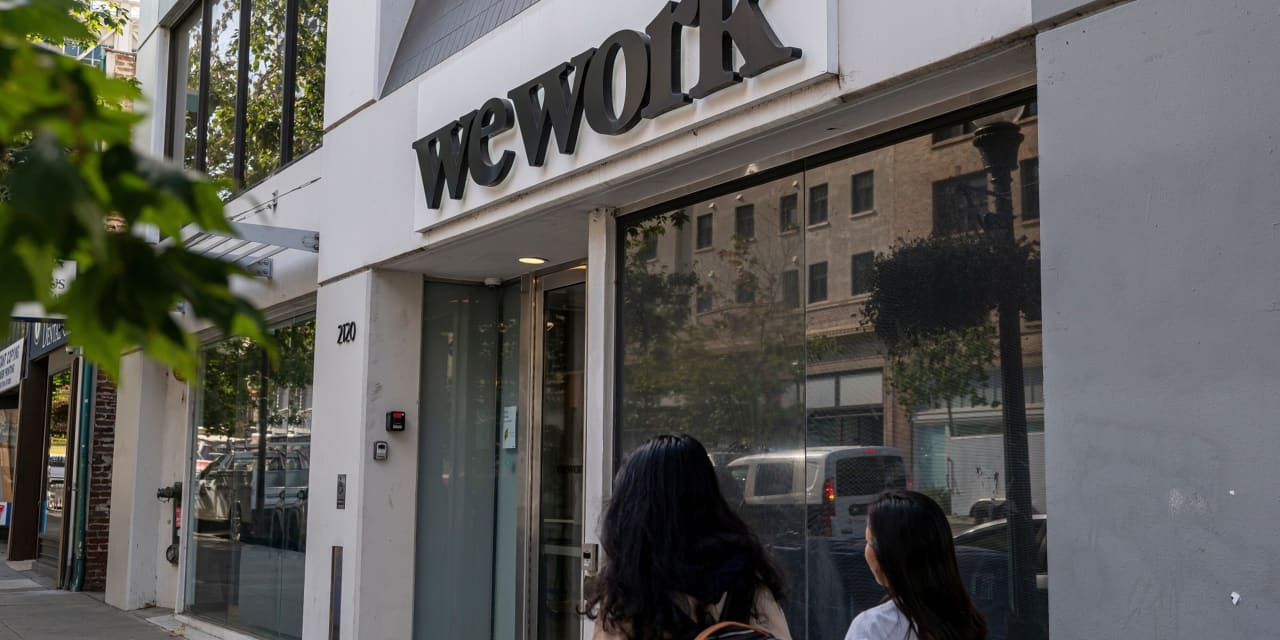In the end, not even
SoftBank
CEO Masayoshi Son could save
WeWork
(ticker: WE) from a combination of bad decision-making, overpriced leases, and the lingering economic effects of Covid-19.
On Monday night, the office-sharing firm filed for protection from creditors under Chapter 11 of the federal bankruptcy code.
It’s a black eye for Son and SoftBank, which owns about 74% of WeWork’s stock. The shares are down more than 99% this year, and are now likely to expire worthless. Son made one of the best venture investments in history with an early bet on
Alibaba
(BABA). In WeWork, he made one of the worst.
WeWork’s story is long and complex. Founded in 2010 by the entrepreneur Adam Neumann, the company at one point raised capital at a valuation of $47 billion. But Neumann’s wild-eyed optimism about the company was never fulfilled. The company’s first attempt at an initial public offering was withdrawn in 2019, amid investor concerns about mounting losses, a rich valuation, and allegations of weak corporate governance practices.
On Monday, in anticipation of a bankruptcy filing, Neumann said the news was disappointing. “It has been challenging for me to watch from the sidelines since 2019 as WeWork has failed to take advantage of a product that is more relevant today than ever before,” he said in a statement. “I believe that, with the right strategy and team, a reorganization will enable WeWork to emerge successfully.”
Shortly after the original IPO flopped, SoftBank unveiled one in a series of financial rescue plans, which gave SoftBank most of WeWork’s equity, while stripping Neumann of voting control of his remaining shares in the company.
WeWork finally reached the public market in October 2021, in the middle of the pandemic, via a merger with the special purpose acquisition company called BowX Acquisition Corp. It was initially valued at $9 billion. For a brief moment, it looked like a surprise win for SoftBank.
But becoming a public company couldn’t cure WeWork’s problems. Ultimately, the firm was hurt by a combination of the work-from-home trend that emerged during the pandemic and pressure on the company’s finances from higher interest rates.
In March 2023, SoftBank made another attempt to shore up WeWork, agreeing to a recapitalization plan that reduced the company’s indebtedness in part by converting a portion of WeWork’s borrowings into equity. That deal canceled or converted to equity $1.5 billion worth of debt, including $1 billion held by SoftBank.
That wasn’t enough.
Along with its quarterly financial results in August, the company included a warning that there was “substantial doubt” about its ability to remain a going concern. As of June 30, the company still had $2.9 billion in long-term debt, as well as $13.3 billion in long-term lease obligations. Revenue in the June quarter was $844 million, up 4% from a year earlier. The company had a loss in that quarter of $397 million, narrowing from $634 million in the year-ago period.
Now creditors, under the protection of the bankruptcy courts, will try to figure out if WeWork’s underlying business—short-term office rentals—can be salvaged. It won’t be the first time the company’s debt holders have tried to solve the WeWork problem.
The failed stock will leave behind scars on the commercial real estate market—and more damage to the reputation of founder Neumann and his primary ally, SoftBank.
“During this period, WeWork will further rationalize its commercial office lease portfolio while focusing on business continuity and delivering best-in-class services to its members, as global operations are expected to continue as usual,” WeWork said Monday night.
WeWork shares had been halted pending news during Monday’s trading session. SoftBank, which is scheduled to report quarterly results on Thursday, had declined to comment on the trading halt and the potential bankruptcy filing.
Write to Eric J. Savitz at [email protected]
Read the full article here













